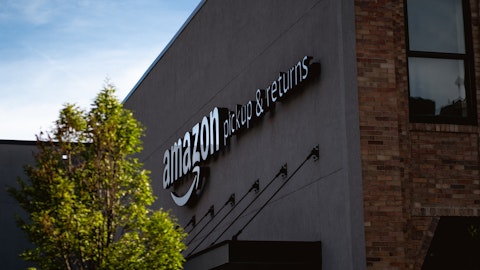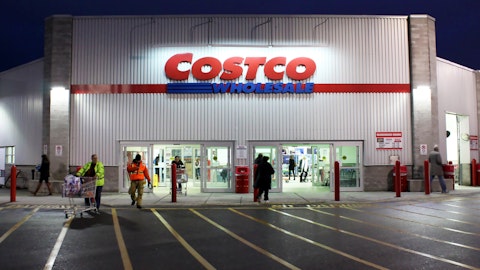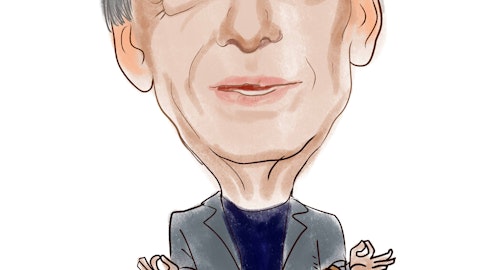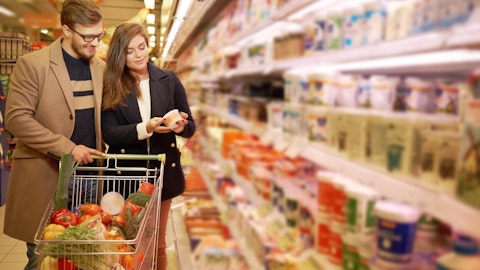So that’s not in our mobile e-commerce sales. As it relates to EV charging, we’re testing it in a number of locations. Not a whole lot to be said. If there is a charge for it, it’s going to be less Costco and we’ll wait and see. And then as it relates to China, no, we just opened a few weeks ago, our fifth location. We have two more planned this fiscal year, both in the – I think one in Shenzhen in early calendar ’24 and one other one before the end of August. So we’ll have seven locations, up from two, a year and a half ago. And so far, our openings there have treated us well overall.
Oliver Chen: Thank you. Best regards.
Operator: We’ll take our next question from Scot Ciccarelli with Truist.
Scot Ciccarelli: Good evening, guys. Can you help us understand a bit better how the Costco Next process works? I mean, is it similar to how your e-commerce business used to work, where products were essentially drop-shipped from their vendors? And if that’s the case, Richard, how do you control the quality of the product and delivery process, because I thought that became an issue for you guys before you took over your own distribution for e-com?
Richard Galanti: Yes, Costco Next is drop-shipped. We curate the items with these suppliers. And for the most part pretty well-known brands. And so far we have not had an issue on that, recognizing it’s – they tend to be items that are easily shipped to home. Yes, we’re doing – we have all the tracking information as well. So all I can tell you is, you’re right about that, that’s a good point. Years ago when we did this, there was a difference, but so far it’s worked quite well for us. We’ve had very few customer issues as it relates to items purchased on costco.com on costconext.com.
Scot Ciccarelli: Okay. Understood. Thank you. And then another inflation question, if we do wind up getting outright deflation outside of improved traffic or unit block, are there ways to protect margin because it seems to me like that could wind up being a deflator to the margin, if we’re in a deflationary environment there?
Richard Galanti: Well, yes that’s what our business is about, where we’ll take a 10-pack and make it a 12-pack, I guess. But at the end of the day, if there’s is inflation, it will impact all of us, but again. I think it should be favorable with us because we will show the best value – we’ll still show the best value out there.
Scot Ciccarelli: Understood. Thank you.
Richard Galanti: Before you do it, another comment was made in the table here, that if there is deflation and disinflation, we’ve got a $450 million and $500 million LIFO reserve, that’ll be – on a reported basis will be part of a tailwind of disinflation.
Scot Ciccarelli: Got it. Thank you.
Operator: We’ll take our next question from Scott Mushkin with R5 Capital.
Scott Mushkin: Hi, Richard, thanks for – thanks for taking my question. I don’t think we’ve talked about it, but what’s competition like out there, now that we’re seeing inflation come down in volumes, particularly for some guys are negative, just wondering if you – what it looks like out there?
Richard Galanti: I think, look we’ve said this for a few years now, our competition with Sam’s is the most direct and we’ve seen improvements in parts of what they do from our perspective. They are tough competitors and so are we, and – but I think they continue to get to improve overtime, as have we. I don’t – we don’t really see a whole lot of other things. BJ’s is why we expect their model and what they do. It’s a slightly different model. So there’s not as much – there is certainly – when we are competing directly as a membership warehouse club, we’re making sure we’re sharp on pricing, particularly in fresh and things like that supermarket items. Beyond that, our view is on the non-food side, we are gaining share. As evidenced by the numbers we see in some of these NPD results. And the thing that I just called out on appliances grew like that. Recognizing appliances of whatever a $30 billion business, we’re still a small piece of it, but growing rapidly.
Scott Mushkin: Thanks. And then, I know it came up earlier about raising membership rates, but I kind of philosophical like this recession, not recession, maybe there will be one, how does the company look at raising the membership fee, if the economy is slow and fast? Does it matter? Does it factor in?
Richard Galanti: I think. I think it matters. It does matter and I think it really mattered as we approached kind of the 5.5 years. Post June 17th, we were in the high – the headline every day was inflation and economy. And so, we’re doing great. We’ve got great loyalty. If we wait a little longer, so be it. And that’s kind of how we feel right now. So…
Scott Mushkin: Okay, great. Thanks, I’ll yield.
Operator: We’ll take our next question from Chris Horvers with JPMorgan.
Chris Horvers: Thanks. Good evening, Richard. So your core and core margins were up a lot in this quarter. Can you talk about what drove that? I think you mentioned food and sundries, that successful vendor-funded promotions, is there anything one-time in nature about that gain that we shouldn’t extrapolate forward?
Richard Galanti: Yes, well, aside from LIFO, markdowns were lot less, quarter-on-quarter, so no markdowns. It was a big piece of it, particularly on the non-food side, that helped. Last year we had – it was a year ago that all of us including Costco, I think our inventories on a year-over-year basis were up 26% for two quarters in a row. And, of course, those will come down and so that was probably the biggest single thing in those numbers. And the comment that was made at the table here, we’re back on track on seasonal in and out dates. So we’re not having – a year – it was a year, year and a half ago where certain seasonal items came in late and just to move them out, not to have to store as much, some we did store, but to move them out where we felt that was the best way to do it, we take extra markdowns. So that helped.
Chris Horvers: And then a follow-up question around the consumer, you just came through the back-to-school season. There are some important electronics categories that are a big part of the basket during that time of year that also become a big part of the basket around holidays. Are you seeing, iPads and PCs and notebooks? Are you seeing positive unit trends and how does that make you feel about the upcoming holiday season?
Richard Galanti: Gaming is up, some of the Apple products are up, TV units are up, but again, the average price points have come down some. Tablets are up and audio is up a little.
Chris Horvers: But not notebooks and computers?





